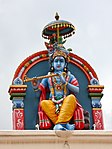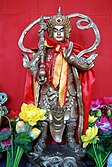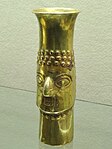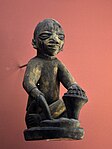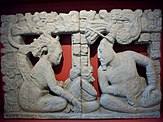|
神々()とは、神性があり神聖であると考えられている、超自然的な存在である[1]。オックスフォード英英辞典では、deity を「(多神教における)神または女神」、及び神のように畏敬されるものと定義している[2]。C ・スコット・リトルトンは神々を「普通の人々のそれよりも偉大な力を伴った存在ではあるが、人々を普段の人生の閉塞した囚われを越えて、新しい意識の水準へと連れて行くことで、肯定的または否定的に、人々と交流する者である」と定義している[3]。神々は、男神や女神として言及される。
宗教は幾つの神々を崇拝するかによって分類され得る。一神教は(主に神として言及される)唯一神のみを受け入れ[4][5]、多神教は複数の神々を受け入れている[6]。単一神教は最高神を受け入れるが他の神々を否定せず、それらを同じ神性の原理の側面であると考える[7][8]。そして非有神的宗教はあらゆる至上で永遠なる創造神を否定するが、生きて死にそしてまた同様の他の存在に生まれるかもしれない神々のパンテオンを受け入れる[9]:35–37[10]:357–58。
大抵の一神教は伝統的にその神を全能・遍在・全知・全ての善・永久であると見做しているが、[11][12][13] これらの性質は「神々」の定義付けにとって必須ではなく[14][15][16]、様々な文化がそれらの神々を異なって概念化した[14][15]。一神教は概して神を男性形の語で指し示す[17][18]:96が、その他の宗教ではそれらの神々を、男性・女性・両性・無性別といった様々な形で言及する[19][20][21]。
歴史的に、古代メソポタミア人・エジプト人・ギリシア人・ローマ人・ノース人などの多くの古代の文化が、自然現象を意図的な因果であるとして様々に人格化した[22][23][24]。一部のアヴェスターとヴェーダの神々は倫理的な概念として見なされた[22][23]。インド発祥の宗教では、神々は感覚器官や頭脳としてあらゆる生き物の体内に宿り現れていると想像された[25][26][27]。神々は転生後の存在の一形態(輪廻)として描かれた。そこで道徳的な人生を通じて功徳を得た人は守護神となって天国で至福に生きるが、その功徳が失われたら死なねばならないともされた[9]:35–38[10]:356–59。
参照
- ^ O'Brien, Jodi (2009) (英語). Encyclopedia of Gender and Society. Los Angeles: Sage. p. 191. ISBN 978-1-4129-0916-7. https://books.google.co.jp/books?id=_nyHS4WyUKEC 28 June 2017閲覧。
- ^ Stevenson, Angus (2010) (英語). Oxford Dictionary of English (3rd ed.). New York: Oxford University Press. p. 461. ISBN 978-0-19-957112-3. https://books.google.co.jp/books?id=anecAQAAQBAJ 28 June 2017閲覧。
- ^ Littleton, C. Scott (2005) (英語). Gods, Goddesses, and Mythology. New York: Marshall Cavendish. p. 378. ISBN 978-0-7614-7559-0. https://books.google.co.jp/books?id=3ufSStXPECkC&pg=PA378 28 June 2017閲覧。
- ^ Becking, Bob; Dijkstra, Meindert; Korpel, Marjo; Vriezen, Karel (2001) (英語). Only One God?: Monotheism in Ancient Israel and the Veneration of the Goddess Asherah. London: New York. p. 189. ISBN 978-0-567-23212-0. https://books.google.co.jp/books?id=eMneBAAAQBAJ&pg=PA189 28 June 2017閲覧. "The Christian tradition is, in imitation of Judaism, a monotheistic religion. This implies that believers accept the existence of only one God. Other deities either do not exist, are seen as the product of human imagination or are dismissed as remanents of a persistent paganism"
- ^ Korte, Anne-Marie; Haardt, Maaike De (2009) (英語). The Boundaries of Monotheism: Interdisciplinary Explorations Into the Foundations of Western Monotheism. Brill. p. 9. ISBN 978-90-04-17316-3. https://books.google.co.jp/books?id=-53d1iRsqDEC 28 June 2017閲覧。
- ^ Brown, Jeannine K. (2007) (英語). Scripture as Communication: Introducing Biblical Hermeneutics. Baker Academic. p. 72. ISBN 978-0-8010-2788-8. https://books.google.co.jp/books?id=5QJjyGoxEzkC 28 June 2017閲覧。
- ^ Taliaferro, Charles; Harrison, Victoria S.; Goetz, Stewart (2012) (英語). The Routledge Companion to Theism. Routledge. pp. 78–79. ISBN 978-1-136-33823-6. https://books.google.co.jp/books?id=ct7fCgAAQBAJ 28 June 2017閲覧。
- ^ Reat, N. Ross; Perry, Edmund F. (1991) (英語). A World Theology: The Central Spiritual Reality of Humankind. Cambridge University Press. pp. 73–75. ISBN 978-0-521-33159-3. https://books.google.co.jp/books?id=vD2TJNc7NE4C 28 June 2017閲覧。
- ^ a b Keown, Damien (2013) (英語). Buddhism: A Very Short Introduction (New ed.). Oxford: Oxford University Press. ISBN 978-0-19-966383-5. https://books.google.co.jp/books?id=_QXX0Uq29aoC 22 June 2017閲覧。
- ^ a b Bullivant, Stephen; Ruse, Michael (2013) (英語). The Oxford Handbook of Atheism. Oxford University Publishing. ISBN 978-0-19-964465-0. https://books.google.co.jp/books?id=jbIVAgAAQBAJ 22 June 2017閲覧。
- ^ Taliaferro, Charles; Marty, Elsa J. (2010). A Dictionary of Philosophy of Religion. A&C Black. pp. 98–99. ISBN 978-1-4411-1197-5. https://books.google.co.jp/books?id=78962vlrCDcC&pg=PA98
- ^ Wilkerson, W.D. (2014). Walking With The Gods. Lulu.com. pp. 6–7. ISBN 978-0-9915300-1-4. https://books.google.co.jp/books?id=GXCwBgAAQBAJ&pg=PA6
- ^ Trigger, Bruce G. (2003). Understanding Early Civilizations: A Comparative Study (1st ed.). Cambridge University Press. pp. 473–74. ISBN 978-0-521-82245-9. https://books.google.co.jp/books?id=ZEX-yZOAG9IC
- ^ a b Hood, Robert Earl (1990). Must God Remain Greek?: Afro Cultures and God-talk. Fortress Press. pp. 128–29. ISBN 978-1-4514-1726-5. https://books.google.co.jp/books?id=-ceFU75KyYQC&pg=PA128. "African people may describe their deities as strong, but not omnipotent; wise but not omniscient; old but not eternal; great but not omnipresent (...)"
- ^ a b Trigger, Bruce G. (2003). Understanding Early Civilizations: A Comparative Study (1st ed.). Cambridge: Cambridge University Press. pp. 441–42. ISBN 978-0-521-82245-9. https://archive.org/details/understandingear0000trig. "[Historically...] people perceived far fewer differences between themselves and the gods than the adherents of modern monotheistic religions. Deities were not thought to be omniscient or omnipotent and were rarely believed to be changeless or eternal"
- ^ Murdoch, John (1861). English Translations of Select Tracts, Published in India: With an Introd. Containing Lists of the Tracts in Each Language. Graves. pp. 141–42. https://books.google.co.jp/books?id=IHQAAAAAMAAJ&pg=PA141. "We [monotheists] find by reason and revelation that God is omniscient, omnipotent, most holy, etc, but the Hindu deities possess none of those attributes. It is mentioned in their Shastras that their deities were all vanquished by the Asurs, while they fought in the heavens, and for fear of whom they left their abodes. This plainly shows that they are not omnipotent."
- ^ Kramarae, Cheris; Spender, Dale (2004) (英語). Routledge International Encyclopedia of Women: Global Women's Issues and Knowledge. Routledge. p. 655. ISBN 978-1-135-96315-6. https://books.google.co.jp/books?id=QAOUAgAAQBAJ 28 June 2017閲覧。
- ^ O'Brien, Julia M. (2014) (英語). Oxford Encyclopedia of the Bible and Gender Studies. Oxford University Press, Incorporated. ISBN 978-0-19-983699-4. https://books.google.co.jp/books?id=ZU-nBAAAQBAJ 22 June 2017閲覧。
- ^ Bonnefoy, Yves (1992) (英語). Roman and European Mythologies. Chicago: University of Chicago Press. pp. 274–75. ISBN 978-0-226-06455-0. https://books.google.co.jp/books?id=Uf2_kHAs22sC 28 June 2017閲覧。
- ^ Pintchman, Tracy (2014) (英語). Seeking Mahadevi: Constructing the Identities of the Hindu Great Goddess. SUNY Press. pp. 1–2, 19–20. ISBN 978-0-7914-9049-5. https://books.google.co.jp/books?id=JfXdGInecRIC 28 June 2017閲覧。
- ^ Roberts, Nathaniel (2016) (英語). To Be Cared For: The Power of Conversion and Foreignness of Belonging in an Indian Slum. University of California Press. p. xv. ISBN 978-0-520-96363-4. https://books.google.co.jp/books?id=UVPQCwAAQBAJ 28 June 2017閲覧。
- ^ a b Malandra, William W. (1983) (英語). An Introduction to Ancient Iranian Religion: Readings from the Avesta and the Achaemenid Inscriptions. Minneapolis, MN: University of Minnesota Press. pp. 9–10. ISBN 978-0-8166-1115-7. https://books.google.co.jp/books?id=nZQMrjukmboC&pg=PA9 28 June 2017閲覧。
- ^ a b Fløistad, Guttorm (2010) (英語). Volume 10: Philosophy of Religion (1st ed.). Dordrecht: Springer Science & Business Media B.V.. pp. 19–20. ISBN 978-90-481-3527-1. https://books.google.co.jp/books?id=BclABayC1QQC&pg=PA19 28 June 2017閲覧。
- ^ Potts, Daniel T. (1997). Mesopotamian Civilization: The Material Foundations (st ed.). Ithaca, NY: Cornell University Press. pp. 272–74. ISBN 978-0-8014-3339-9. https://books.google.co.jp/books?id=OdZS9gBu4KwC&pg=PA272 22 January 2018閲覧。
- ^ Potter, Karl H. (2014) (英語). The Encyclopedia of Indian Philosophies, Volume 3: Advaita Vedanta up to Samkara and His Pupils. Princeton University Press. pp. 272–74. ISBN 978-1-4008-5651-0. https://books.google.co.jp/books?id=Ydf_AwAAQBAJ&pg=PA272 28 June 2017閲覧。
- ^ Olivelle, Patrick (2006) (英語). The Samnyasa Upanisads: Hindu Scriptures on Asceticism and Renunciation.. New York: Oxford University Press. p. 47. ISBN 978-0-19-536137-7. https://books.google.co.jp/books?id=fB8uneM7q1cC&pg=PA47 28 June 2017閲覧。
- ^ Cush, Denise; Robinson, Catherine; York, Michael (2008) (英語). Encyclopedia of Hinduism. London: Routledge. pp. 899–900. ISBN 978-1-135-18979-2. https://books.google.co.jp/books?id=kzPgCgAAQBAJ&pg=PA899 28 June 2017閲覧。
関連項目
|
